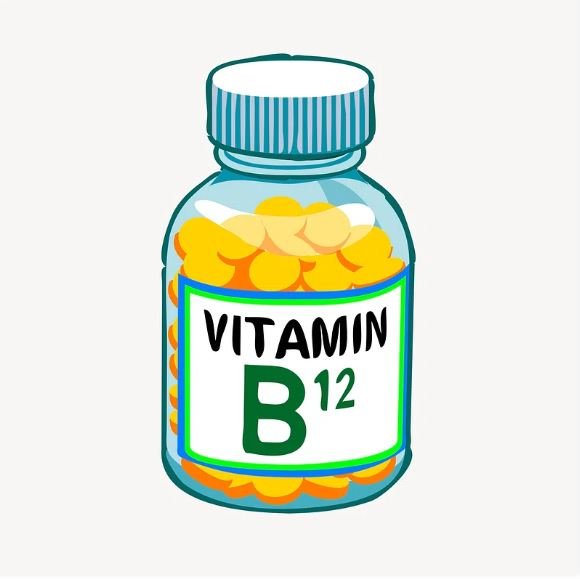Vitamin B12: Everything You Need to Know for Optimal Health

Table of Contents
The Importance of Vitamin B12 in Maintaining Overall Health
Vitamin B12, also known as cobalamin, is a crucial water-soluble vitamin that plays an essential role in the functioning of the brain and nervous system, the formation of red blood cells, and the creation of DNA. It’s vital for maintaining energy levels, memory, heart health, and more.
Key Functions of Vitamin B12
- DNA Synthesis: Vitamin B12 is integral in the production of DNA, the genetic material in all cells.
- Red Blood Cell Formation: It helps prevent a type of anemia called megaloblastic anemia that makes people tired and weak.
- Neurological Function: B12 supports the maintenance of healthy nerve cells and helps in the production of neurotransmitters.
Sources of Vitamin B12
Primarily found in animal products, B12 sources include meat, fish, poultry, eggs, milk, and milk products. For vegetarians or vegans, fortified foods or supplements can be key to avoiding deficiency.
Table of Contents
Signs and Symptoms of Vitamin B12 Deficiency
Vitamin B12 deficiency can lead to various health issues, including fatigue, weakness, constipation, loss of appetite, and weight loss. More severe cases can result in nerve problems, such as numbness and tingling in the hands and feet.
Causes of Deficiency
- Dietary Lack: Especially in vegetarians and vegans.
- Absorption Issues: Such as those caused by pernicious anemia or gastrointestinal surgery.
Addressing Deficiency
Early diagnosis and treatment are crucial. B12 injections or oral supplementation can effectively reverse the deficiency.
Understanding Vitamin B12 Sources: Foods and Supplements
Ensuring adequate intake of Vitamin B12 is essential for health maintenance. Animal products are the most reliable natural sources. However, fortified foods and supplements offer alternative sources for those on plant-based diets.
Best Dietary Sources
- Animal Products: Beef liver, clams, fish, meat, poultry, eggs, and dairy.
- Fortified Foods: Certain breakfast cereals, plant-based milk, and nutritional yeast.
Supplemental Forms
For some, supplements might be necessary. They come in various forms, including pills, sublingual tablets, and injections.
How Vitamin B12 Supports Brain Health and Cognitive Function
Vitamin B12’s role in brain health cannot be overstated. It helps maintain the health of nerve cells and is crucial for neurotransmitter signaling that helps your brain process information.
Cognitive Benefits
- Memory Enhancement: Adequate B12 levels are associated with improved memory performance.
- Mood Regulation: It plays a part in synthesizing and metabolizing serotonin, a chemical responsible for regulating mood.
Preventing Cognitive Decline
Studies suggest that B12 deficiency may increase the risk of Alzheimer’s disease and other cognitive issues. Regular intake is crucial for mental health and cognitive longevity.
Vitamin B12 and Energy: Boosting Your Vitality Naturally
Feeling tired or lacking energy can sometimes be attributed to Vitamin B12 deficiency, due to its vital role in energy production.
Role in Energy Production
- Metabolism: B12 is needed to convert carbohydrates into glucose, which is used by our body for energy.
Enhancing Energy Levels
Regular intake of Vitamin B12 can help improve energy levels, especially for those with a deficiency. However, for people with adequate B12 levels, extra supplementation might not boost energy further.
The Role of Vitamin B12 in Red Blood Cell Production and Anemia Prevention
Vitamin B12 plays a crucial role in the production of red blood cells, which are essential for transporting oxygen throughout the body. A deficiency in this vital nutrient can lead to a specific type of anemia known as megaloblastic anemia, characterized by the production of abnormally large red blood cells that are unable to function properly.
Understanding Anemia
- Megaloblastic Anemia: This condition arises when there’s a shortage of red blood cells, leading to symptoms like fatigue and weakness due to insufficient oxygen supply to the body’s tissues.
Preventing Anemia
Regular intake of Vitamin B12, whether through diet or supplements, is key to preventing megaloblastic anemia. Ensuring a balanced intake of B12 is especially important for people at risk of deficiency, such as vegetarians, vegans, and older adults.
Vitamin B12 and Heart Health: What You Need to Know
Vitamin B12, along with folate and Vitamin B6, plays a significant role in maintaining heart health by managing levels of homocysteine in the blood. Elevated homocysteine levels are associated with an increased risk of heart disease.
Lowering Homocysteine Levels
- Homocysteine: An amino acid that, at high levels, is thought to contribute to artery damage and heart disease.
- B12’s Role: By helping to convert homocysteine into other substances, Vitamin B12 helps keep its levels in check, thus reducing the risk of heart disease.
Supporting Heart Health
A balanced diet rich in B vitamins, including B12, is essential for reducing the risk of heart disease and supporting overall cardiovascular health.
Vitamin B12 and Nerve Health: Protecting Your Nervous System
Vitamin B12’s role in maintaining nerve health is crucial. It is involved in the production of myelin, the protective sheath that covers nerves and ensures the rapid transmission of signals between your brain and body parts.
Nerve Damage Prevention
- Myelin Sheath Formation: B12 is essential for the maintenance of the myelin sheath.
- Neuropathy Prevention: Adequate levels of B12 can help prevent neuropathy, a condition characterized by nerve damage that can lead to tingling, numbness, and other sensations.
Enhancing Nerve Function
Ensuring sufficient Vitamin B12 intake supports nerve repair and the maintenance of a healthy nervous system, crucial for overall bodily functions.
Vitamin B12 and Mood Regulation: Enhancing Mental Wellbeing
Vitamin B12 has a significant impact on mood and brain health, thanks to its role in synthesizing and metabolizing serotonin, a neurotransmitter directly linked to mood regulation. A deficiency in B12 can lead to mood disturbances and even depression.
Boosting Serotonin Production
- Serotonin: Known as the “feel-good” neurotransmitter, its levels are crucial for mood stabilization.
- B12’s Role: By aiding in the production of serotonin, Vitamin B12 can help improve mood and reduce the risk of depression.
Supporting Mental Wellbeing
Regular intake of Vitamin B12, whether through diet or supplementation, may support mental health and enhance mood, contributing to a better quality of life.
Meeting Your Vitamin B12 Needs: Tips for Optimal Absorption and Utilization
Ensuring your body has enough Vitamin B12 is essential for good health, but some people may have trouble absorbing this vital nutrient efficiently. Here are some tips to enhance B12 absorption and utilization.
Enhancing Absorption
- Adequate Stomach Acid: Necessary for B12 absorption, so individuals with reduced stomach acidity may need supplements.
- B12-Rich Diet: Incorporate B12 sources into your diet, like meat, fish, dairy, and fortified foods.
Utilization Tips
- Regular Screening: Especially for older adults and those at risk of deficiency.
- Supplementation: For those unable to meet their needs through diet alone, B12 supplements can be a viable option.
Final Thoughts:
Vitamin B12 plays a crucial role in maintaining our overall health and well-being. From supporting nerve function to aiding in the formation of red blood cells, this essential nutrient is involved in numerous bodily processes.
Throughout this article, we’ve explored the importance of Vitamin B12, its sources, and the potential consequences of deficiency. We’ve learned that while Vitamin B12 is primarily found in animal products, supplementation or fortified foods can provide alternatives for vegetarians and vegans.
Furthermore, we’ve discussed the risk factors for Vitamin B12 deficiency, including age, dietary choices, and certain medical conditions. Recognizing the symptoms of deficiency, such as fatigue, weakness, and neurological issues, is crucial for timely intervention and treatment.
Incorporating Vitamin B12-rich foods into your diet, such as fish, meat, dairy products, and fortified cereals, can help ensure adequate intake. Additionally, consulting with a healthcare professional for personalized guidance on supplementation or dietary modifications is recommended, especially for those at higher risk of deficiency.
By prioritizing the consumption of Vitamin B12 and maintaining a balanced diet, you can support your body’s vitality and longevity. Remember, your health is an investment, and nourishing your body with essential nutrients like Vitamin B12 is a fundamental step toward optimal well-being.
FAQs:
What is Vitamin B12, and why is it important?
Vitamin B12, also known as cobalamin, is a water-soluble vitamin that plays a crucial role in various bodily functions. It is essential for nerve function, DNA synthesis, red blood cell formation, and the metabolism of fats and carbohydrates.
What are the main food sources of Vitamin B12?
Vitamin B12 is primarily found in animal products such as meat (especially liver), poultry, fish, eggs, and dairy products. Fortified foods, such as breakfast cereals, plant-based milk alternatives, and nutritional yeast, are also sources of Vitamin B12 for vegetarians and vegans.
Who is at risk of Vitamin B12 deficiency?
Individuals at risk of Vitamin B12 deficiency include vegetarians and vegans who do not consume adequate fortified foods or supplements, older adults with reduced stomach acid production, individuals with gastrointestinal disorders affecting nutrient absorption (such as Crohn’s disease or celiac disease), and those who have undergone certain surgeries (such as gastric bypass surgery).
What are the symptoms of Vitamin B12 deficiency?
Symptoms of Vitamin B12 deficiency may include fatigue, weakness, pale or jaundiced skin, shortness of breath, dizziness, numbness or tingling in the hands and feet, difficulty walking, cognitive impairment, and mood changes. Severe or prolonged deficiency can lead to neurological complications and anemia.
How is Vitamin B12 deficiency diagnosed?
Vitamin B12 deficiency is typically diagnosed through blood tests that measure serum levels of Vitamin B12 and other related markers, such as methylmalonic acid (MMA) and homocysteine. In some cases, additional tests, such as a complete blood count (CBC) or a bone marrow biopsy, may be performed to assess the extent of anemia or other complications.
Can Vitamin B12 deficiency be treated?
Yes, Vitamin B12 deficiency can often be treated effectively with oral or intramuscular Vitamin B12 supplements. Depending on the severity of the deficiency and underlying causes, treatment may involve high-dose supplementation followed by maintenance therapy. In some cases, dietary modifications or addressing underlying medical conditions may also be necessary.
Are there any risks associated with Vitamin B12 supplementation?
Vitamin B12 supplementation is generally considered safe and well-tolerated when taken as directed. However, high doses of Vitamin B12 supplements may interact with certain medications or medical conditions. It’s important to consult with a healthcare professional before starting any new supplement regimen, especially if you have pre-existing health conditions or are taking medications.
Can Vitamin B12 be obtained from plant-based sources?
While the primary food sources of Vitamin B12 are animal-based, fortified plant foods and supplements can provide alternative sources for vegetarians and vegans. Fortified foods, such as breakfast cereals, plant-based milk alternatives, and nutritional yeast, are typically fortified with Vitamin B12 and can help meet dietary requirements for individuals following plant-based diets. However, it’s essential to check labels and choose fortified foods that provide adequate amounts of Vitamin B12.


